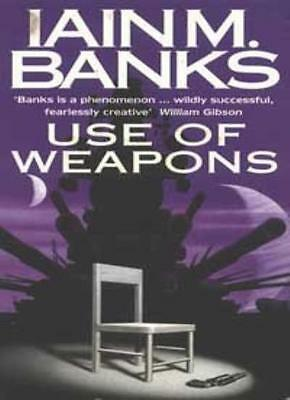I haven’t read all of Iain M. Banks The Culture series, but I highly recommend Use of Weapons. I’ve read it three times, and it gets better each time.
It’s not a bad introduction to The Culture, but please feel free to recommend another novel to start with, or your favourite. I’ve read this, Look to Windward, Consider Phlebas, and The Player of Games. As I recall, Look to Windward has some good descriptions of a large Culture ship.
I’d also love to hear your favourite ship name.
Edit: I see I added The to the title…



I think it fills a niche as pro-utopian series besides Star Trek in science fiction. There just aren’t that many works that start from the premise that post scarcity society can actually happen, or that there’s more of interest to the idea than their collapse.
Yeah I agree with you there. Dystopia, collapse, Humanity meeting it’s own hubris, or a few good people in an evil world - those ideas seem to fuel a lot of Sci-fi. AI is bad, and Robots are generally evil is another trope.
The Culture is refreshing in that it shows a utopia that feels like it could actually happen - AIs aren’t automaticlaly bad, but also post-scarcity really does mean something. So much Sci Fi tries to avoid the truth about post-scarcity as a concept; even in just our own Solar System there is immense wealth we can barely grasp the scale of, and with AI and Robotics the idea that humankind would be freed to a life of leisure, art and pursuit of invidual goals.
It all comes down to some fundamental questions which we as a civilization will have to answer: who “owns” an AI? Who owns a robot and it’s output? What is the point in captialism if AI and Robots can produce everything we need? Getting there may be a rocky road, but I think we really only have two end points: Utopia or complete collapse on the way. Anything in between doesn’t make much sense as a stable state when you consider meaning of a post-scarcity society or the technological singularity.
@BananaTrifleViolin @terminateprocess @severien @RupeThereItIs @DragonTypeWyvern
I used to read dystopian sci-fi but now I read the news.
Banks culture novels were a refreshing break from bleak ultra free market future nightmares that have become the sci-fi standard, especially in US sci-fi. I honestly can’t read any more of it.
Maybe we need more Scottish sci-fi
https://www.nls.uk/learning-zone/literature-and-language/science-fiction-in-scotland/
IDK if you think the culture is a utopia you read different books then I did.
It’s a utopia in almost the same way the world of Brave New World is a utopia… Only if you look skin deep. Any deeper look it’s either same shit different day or perhaps even a distopian where human like species are effectively pets or zoo animals for AI.
I did NOT read the culture as something good.
Found the Horza.
It’s certainly an idea Banks addresses. Even most of the protagonists are those who have seen the life in the Culture and looked for something with meaning beyond existing in bliss, but I also think that The Culture is certainly the best option of those presented in the series.
If nothing else they’re so rabidly anarchist (in the non scare tactic use of the word) that anyone who does not like The Culture just, you know, leaves, and they aren’t even judged for it.
The Culture is a true utopia.
Humans are essentially pets of the AIs in The Culture, yes, but anyone is free to join or leave as they desire, and these “pets” have greater freedom than any human being who has ever lived.
A novel without conflict would be boring and useless, for example see (or preferably do not see) “Gentlemen Jole” by Lois McMaster Bujold, so of course the Culture novels show the subsections of society that deal with conflicts, but remember that those members of the Culture that are suffering are there by choice or by the actions of outsiders.